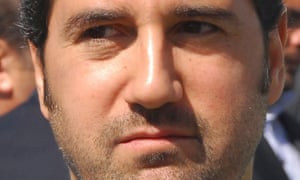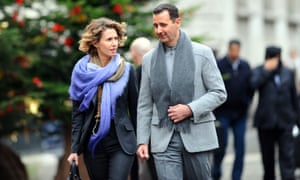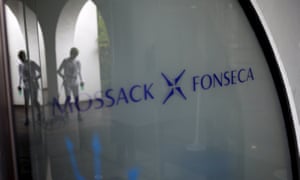
The firm at the centre of the Panama Papers leak serviced a string of companies for a top financier in Bashar al-Assad’s government in the face of international concern about corruption within the Syrian regime.
Documents show Mossack Fonseca’s links to Rami Makhlouf, a cousin of the Syrian president, who was described in US diplomatic cables as the country’s “poster boy for corruption”.
Washington imposed sanctions on Makhlouf in February 2008, saying he was a regime insider who “improperly benefits from and aids the public corruption of Syrian regime officials”. It blacklisted his brother Hafez Makhlouf in 2007.
The documents show, however, that the Panamanian firm continued to work with the Makhloufs, and in January 2011 it rejected the advice of its own compliance team to cut ties with the family as the crisis in Syria began to unfold.
Documents show a Mossack Fonseca compliance officer wrote: “I believe if an individual is found on a sanction list then this is a serious red flag and we should make every effort to disassociate ourselves from them.”
Though Mossack Fonseca was not legally bound to comply with US sanctions, it had an obligation to react to EU measures imposed in May 2011 and extended to the British Virgin Islands (BVI) in June of that year. It took until September 2011 before the partners finally agreed to resign from Makhlouf’s companies.
In a further twist, the documents reveal that thanks to lobbying by the British bank HSBC, Makhlouf was able to keep his Swiss bank accounts open throughout the opening rounds of a civil war in which hundreds of thousands of people have been killed and millions forced to flee their homes over the past five years.
The Panama Papers, a hoard of 11.5m documents leaked from the offshore law firm, show Mossack Fonseca’s links to the Makhloufs for the first time, and how active the bank was in keeping the family plugged into the European financial system until the moment Swiss regulators froze their accounts on 19 May 2011.
Mossack Fonseca is the world’s fourth-largest offshore company provider.
Its data was leaked to the German newspaper Süddeutsche Zeitung and shared by the International Consortium of Investigative Journalists with the Guardian and other media partners around the world.
The paper trail outlines how Mossack Fonseca, HSBC and British officials assisted Makhlouf, whose family was said to be worth $5bn (£3.5bn) before the war, with control of up to 60% of the Syrian economy.

The Makhlouf family empire included duty free, retail, banking and Syria’s largest mobile phone network, Syriatel. Its companies were registered in the BVI, and so not subject to US sanctions.
The BVI are only obliged to uphold European sanctions extended by the UK to its offshore territories. Mossack Fonseca, however, says it has a policy of not dealing with companies and individuals on US blacklists.
HSBC seems to have argued against cutting ties with the Makhloufs. A February 2011 email from Mossack Fonseca’s Geneva officestates: “Mr [X] told me that HSBC compliance department of the bank not only in Geneva but also in their head quarters in London know about Mr. makhlouf [sic] and that they are comfortable with him.”
The Swiss banker also said the US was planning a rapprochement with Assad. “Mr. [X] from HSBC told me also that USA and Syria are revising probable future cooperation.”
Also in February 2011, the Mossack Fonseca partner Chris Zollinger, who has since quit the firm, apparently decided to side with the bank. He emailed: “From my part – if HSBC Head Quarters in England – do not have an issue with the client, then I think we can also accept him.” It was another six months before the firm reversed this decision.
Through a spokesman, Zollinger said his commentary had been based on the assessment of the London and Geneva compliance departments of a well-known international bank. “In retrospective Zollinger says that his commentary was wrong and he regrets it. Six months later Mossack Fonseca resigned as registered agent from these companies.”
The net had already begun to tighten around the Makhloufs in October 2010, when the BVI’s financial investigation agency wrote to Mossack Fonseca to ask for details of the beneficial owner of Drex Technologies SA, the BVI company through which the family managed its stake in Syriatel, according to the US treasury.
Its Geneva office sent an email to HSBC saying: “Please kindly take note that your company Drex Technologies is going to be checked by the Financial Investigation Agency.”
The email caused consternation at Mossack Fonseca’s head office. “For future reference please note that when asking clients to provide us with information/documentation do not inform them that they are being investigated by the Financial Investigation Agency. This is known as ‘Tipping off’ the client.” Tipping off is an offence under the BVI’s Proceeds of Criminal Conduct Act.
HSBC then contacted its client, effectively warning him of the investigation.
On 15 March 2011, Syrian security forces opened fire on pro-democracy marchers in the streets of Damascus. As head of the general intelligence directorate in the Syrian capital at the time, Hafez Makhlouf is reported to have played a key role in the crackdown.
Days later, certificates for Drex were sent to a branch of the Foreign Office. They bore Rami Makhlouf’s name, as the beneficial owner, director and shareholder.
At the request of HSBC in Geneva, they had been couriered to the UK to be signed and stamped by British officials.
For £30, the legalisation office, a branch of the Foreign Office based in Milton Keynes, will place an official seal against any piece of paper it deems to have been certified by a UK public official. The process is known as apostille, and staff are not expected to scrutinise the contents of the documents. There is no suggestion that the foreign secretary at the time, William Hague, knew anything about them.
The Drex documents had been signed and sealed first by the office of the deputy governor of the BVI, then by a “member of the staff of the governor and commander-in-chief, British Virgin Islands” and finally by an official on behalf of “Her Majesty’s principal Secretary of State for Foreign and Commonwealth Affairs”.

Weeks later, on 9 May 2011, the EU issued its own sanctions against Rami and Hafez Makhlouf, whom the US had blacklisted in 2007 for contributing to Syrian interference in Lebanon. Switzerland followed suit on 19 May. The EU sanctions applied in the UK, and were extended by an order in council to the BVI in July 2011.
Records show that it took Mossack Fonseca until 6 September to decide to resign from Makhlouf’s companies. By then, Makhlouf had cut ties with his bank. HSBC told the law firm that the Swiss authorities had frozen Makhlouf’s accounts, and that “they have had no contact with the beneficial owner of this company since the last 3 months”.
HSBC said: “The allegations are historical, in some cases dating back 20 years, predating our significant, well-publicised reforms implemented over the last few years.
“We work closely with the authorities to fight financial crime and implement sanctions. Our policy is clear that offshore accounts can only remain open either where clients have been thoroughly vetted, where authorities ask us to maintain an account for the purposes of monitoring activity, or where an account has been frozen based on sanctions obligations.”
Mossack Fonseca said: “Once these types of situations are identified, we routinely discontinue the provision of our services.” Intermediaries are obliged to tell the firm when clients are sanctioned, and the firm makes its own checks. “We have never knowingly allowed the use of our companies by individuals having any relationship with North Korea, Zimbabwe, Syria or other countries … that might have been considered as a threat to any other country’s national security or that have been listed by a sanctioning body.”
The US Senate censured HSBC’s private Swiss bank in 2012 for not cutting ties with Rami and Hafez Makhlouf, the latter then a Syrian army colonel, after Washington had sanctioned them.
[Source:- The Guardian]





